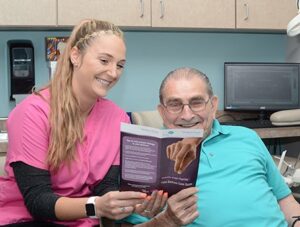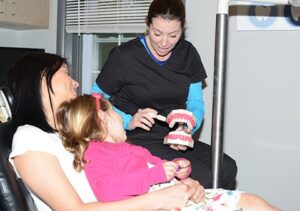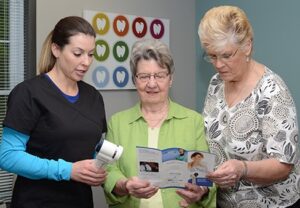




After Any Dental Procedure
It is normal to experience some hot, cold and pressure sensitivity, which should subside. Refrain from eating and drinking hot beverages until the numbness is completely wore off. If your bite feels uneven, if you have persistent pain, or if you have any other questions or concerns, please call us immediately.
After Composite Fillings (white fillings)
When anesthesia has been used, your lips, teeth and tongue may be numb for several hours. Avoid chewing and hot liquids until the numbness wears off. To diminish any tenderness or swelling, you may be advised (even before the numbness wears off) to take ibuprofen. Once the numbness is gone, you may chew on your new fillings right away, since they set completely on the day of your appointment.


Remember that it will take time to adjust to the feel of your new bite. When the position of the teeth is altered, it takes several days for your brain to recognize the new position of your teeth. If you continue to detect any high spots or problems with your bite, call us so we can schedule an adjustment appointment. Mild pain medication should ease your discomfort during the adjustment period. Don’t be concerned if your speech is affected for the first few days, you will quickly adapt and be speaking normally. Any food that could chip, crack or stain your natural teeth can do the same to your new cosmetic restorations. Avoid sticky foods and hard items such as peanut brittle, fingernails, pencils, ice, etc. Minimize your use of and staining beverages such as tea, coffee and red wine. Let us know if you grind your teeth at night or engage in sports so we can make you a custom mouth guard. To preserve the health and beauty of your new smile it is important to maintain a regular oral hygiene routine and regular professional cleaning appointments.
After Tooth Extraction
When a tooth has been extracted it is important for a blood clot to form to stop the bleeding and begin the healing process.
- Bite on gauze until the bleeding stops. This may take 1 to 4 hours depending on the surgery.
- Be careful to not dislodge the blood clots from the surgery site. It is important that the clots stay in place for several days after surgery.
- Do not rinse or spit vigorously, do not suck on straws, smoke, drink alcohol or brush the teeth next to the extraction site for 72 hours.
- Do not stick your tongue or fingers into the surgery site; do not chew food near the surgery site; and limit vigorous exercise for 24 hours.
- Swelling is to be expected, usually subsiding after 48 hours. An ice pack or an unopened bag of frozen peas applied to the area will keep swelling to a minimum. Place ice on your face for 10 minutes and then off for 20 minutes. Repeat this cycle as you feel necessary for up to 24 hours.
- Beginning 24 hours after the extraction you can rinse with salt water (1/2 teaspoon in a cup of water) after meals and before bed.
- Use pain medication as directed. Call our office if the medication doesn’t seem to be working.
- It is important to resume you normal dental routine after 24 hour to speed healing. Avoid commercial mouth rinses as they tend to irritate the site.
- If you have heavy bleeding, severe pain, continued swelling for 2-3 days or a reaction to the medication; call our office immediately at 216-661-8888.
In rare instances, patients may develop Dry Socket. Dry Socket is when a blood clot fails to form in the socket or the clot has been dislodged and the healing is significantly delayed. Following these instructions will reduce the chances of developing dry socket. Dry sockets manifest themselves as a dull throbbing pain, which doesn’t appear until 3-4 days after the extraction. If dry socket does develop, your dentist will apply a medicated dressing to the dry socket to sooth the pain and speed healing.
After Temporary Crowns or Bridges
Occasionally a temporary crown may come off. Call us if this happens and bring the temporary crown with you so we can re-cement it. It is very important for the temporary to stay in place as it will prevent other teeth from moving and compromising the fit of your final restoration. To keep your temporaries in place, avoid eating sticky foods, (gum) and hard foods. If possible, chew on the opposite side of your mouth and floss carefully so you do not dislodge the temporary. Please call with questions, concerns or anything that seems out of the ordinary.
After New Dentures
Your mouth may develop a few sore spots after the first day of wearing your new prosthesis. These areas can be relieved easily at your follow-up appointments. You may not feel entirely comfortable for a period of days. We will adjust the way your teeth contact at your follow-up appointment. Dentures can affect the taste of food and acquire stains and odor. Proper cleaning is required. Do not wear your dentures to bed. Your gum tissue and jaw bones need the rest in order to prevent tissue irritation, infection any future shrinkage. Over time, worn dentures may need to be replaced and relines may be necessary to achieve a snug fit again. To ensure these changes are monitored appropriately, we recommend an annual dental checkup of your tissues and dentures.
After Scaling and Root Planing
Following your procedure, you can expect to notice less redness, less bleeding and less irritation of your gum tissue. Your mouth will taste better. Your gum health can then be maintained with proper home care and regular professional care. Discomfort or pain should not be severe and should subside in 24 hours. Discomfort immediately after treatment is usually associated with slight throbbing. Some slight bleeding may occur during the next several brushings, but will steadily decrease. As gums heal they may change their shape around the teeth. This is normal and will tighten with decreased inflammation. Brush your teeth gently but thoroughly. By the third or fourth day, normal oral hygiene techniques may be resumed. If symptoms are severe or persistent, please call our office.

